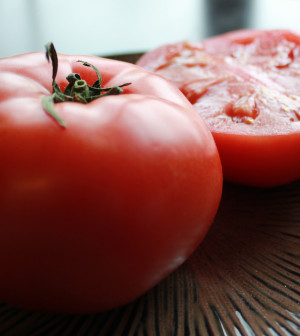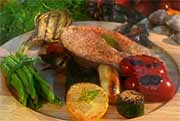- 7 Best Breads for Maintaining Stable Blood Sugar
- Gelatin vs. Collagen: Which is Best for Skin, Nails, and Joints?
- The Long-Term Effects of Daily Turmeric Supplements on Liver Health
- Could Your Grocery Store Meat Be Causing Recurring UTIs?
- Are You Making This Expensive Thermostat Error This Winter?
- Recognizing the Signs of Hypothyroidism
- 10 Strategies to Overcome Insomnia
- Could Artificial Sweeteners Be Aging the Brain Faster?
- Techniques for Soothing Your Nervous System
- Does the Water in Your House Smell Funny? Here’s Why
Mediterranean Diet Tied to Lower Odds of Uterine Cancer


Adhering to a Mediterranean diet may significantly reduce a woman’s risk of uterine cancer, a new study suggests.
“Our research shows the impact a healthy, balanced diet could have on a woman’s risk of developing womb [uterine] cancer. This adds more weight to our understanding of how our everyday choices, like what we eat and how active we are, affect our risk of cancer,” study author Cristina Bosetti, of the IRCCS-Istituto di Ricerche Farmacologiche in Milan, Italy, said in a Cancer Research UK news release.
Bosetti’s team analyzed the diets of more than 5,000 Italian women to determine how well they followed the Mediterranean diet. In general, the diet emphasizes eating vegetables, fruits, nuts, cereals, potatoes, fish and monounsaturated fats, along with moderate alcohol intake, and cutting back on meat and dairy products.
Women who followed seven of the nine components of the Mediterranean diet had a 57 percent reduced risk of uterine cancer, the investigators found.
Those who followed six components of the diet had a 46 percent reduced risk, and those who followed five components had a 34 percent reduced risk, the findings showed.
Women who followed fewer than five components did not have a significantly lower risk of uterine cancer, according to the study published in the May 27 issue of the British Journal of Cancer.
Although the study found an association between adherence to the Mediterranean diet and a reduced risk of uterine cancer, it did not prove a cause-and-effect relationship between the two.
“While we know that getting older and being overweight both increase a woman’s risk of womb [uterine] cancer, the idea that a Mediterranean diet could help reduce the risk needs more research. This is partly because this study was based on people remembering what they had eaten in the past,” Julie Sharp, Cancer Research UK’s head of health information, said in the news release.
“Cancer risk is affected by our age and our genes, but a healthy lifestyle can also play a part in reducing the risk of some cancers,” Sharp added. “Not smoking, keeping a healthy weight, being active, eating healthily and cutting down on alcohol helps to stack the odds in your favor.”
More information
The American Cancer Society has more about endometrial cancer.
Source: HealthDay
Copyright © 2026 HealthDay. All rights reserved.










